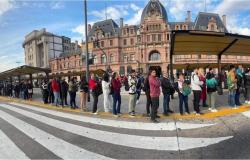The reduction of the working day from 40 to 37.5 hours a week without decline in salary will return to the Council of Ministers on Tuesday. The measure does not have the support of the employer, which has already been off the negotiating table, and not for now with the majority of the congress, where it will spend this time as a bill for its final approval.
The rule was agreed in December between the Ministry of Labor and the CC.oo. and UGT, after a year of negotiations. It was planned to be approved in the second round – with the incorporation of preceptive and advisory opinions – last Tuesday, although the blackout forced the Executive to postpone the decision.
This caused both the Second Vice President and Minister of Labor, Yolanda Díaz, and the unions took advantage of the manifestations for the Day of the Worker to claim this claim, which according to their calculations will benefit 12 million workers, pressing the opposition parties to give their support in the lower house.
“I think I can say that it will be on May 1 in which we have a maximum workday of 40 hours in our country,” Diaz claimed before the media. The union leaders also called the political parties to support this bill, ensuring that it would be “absolutely unpresentable” and “A thymus to democracy” to prevent that debate.
The CEOE warns that it will talk to all games
This circumstance did not go unnoticed by the CEOE, which described as “political opportunism” the fact of taking the reduction of the day to the Council of Ministers so close to the May 1 day. “More collective bargaining and Less normative imposition“He sentenced in a statement.
The employer is still very critical of the imposition by law of the reduction of the day and continues to warn of the negative effects That, in his opinion, he will have this measure about the economy and employment, especially in SMEs.
This same Monday, the president of the employer, Antonio Garamendi, has accused the Minister of Labor to bring a “populist” speech about the measure and has reproached him that Productivity will be trimmedalthough from work they defend the opposite: “In the private company, when things are not going wrong, there is one thing that is called bankruptcy. In the public, when things are going wrong, it is called deficit,” he added in a Telecinco interview that Europa press collects.
Therefore, he has assured that from the CEOE they will speak and are talking with “all parliamentary groups” about the measure. “We want us to hear us“He stressed.
Sanchez says that the reduction of working hours will make companies “better”
Precisely this Monday the president of the government, Pedro Sánchez, has met in Barcelona with entrepreneurs, who has asked that Do not close to the reduction of the day Because it will make companies “better”: “We are convinced that it would contribute to improving the productivity and stability of the working force and, therefore, to our companies,” said Cercle d’Economia.
Sanchez added that the European economy “must maintain its global weight betting on human capital and innovationnot for lowering prices or strenuous days “, and has affirmed that, in his opinion, Spain has proven to be an example of success in this issue in recent years.
Other members of the Executive’s socialist wing have also spoken in recent days about the reduction of working hours, although in a more forceful tone. Coinciding with May 1, the Minister of Digital Transformation, Óscar López, He called “Fachas” and “Ultras” to those who oppose their reduction.
While from adding directly to the PP: “What are your 137 deputies for? To improve the life of 12 million workers or to do the usual: to place themselves against their country? “
No enough support
The truth is that from the PP there is still no official position in this regard. Several ‘barons’ have shown their refusal to reduce the workday, but on the horizon the statements of their president, Alberto Núñez Feijóo, opening the door still, opening the door A four -day work week “in some sectors”.
Faced with the ‘popular’ doubts, the businessmen entrust Junts, which has announced on Monday that it will present an amendment to the totality of the Government’s bill to reduce the day when the initiative arrives at the lower house.
According to your spokesman in Congress, Míriam Nogueras, this rule is “A frontal attack” to self -employed and Catalan SMEswhose viability “puts at risk”: “We find the door closed at the possibility of negotiating even a comma of this law, which has neglected only with the Spanish unions, turning our backs on the Catalan productive fabric,” he said in a press conference from the headquarters of his party.
However, he has subject the withdrawal of this initiative to which the government “Be willing to negotiate” with your party: “We will see if the government wants or not. Until today, they have not had,” Nogueras said, who has not wanted to advance what the changes that would introduce the rule would introduce.
The negotiations continue, according to the Executive
From the Government, however, the presentation of this amendment to the whole and within parliamentary normality. “The Ministry of Labor continues with intense negotiations with the will, on the other hand, that it is the whole of the Parliament that approves this measure,” said the Minister of Culture and spokesman to add Ernest Urtasun.
Its objective, he said, is that the reduction of the day is approved By large majority and even “unanimity”for which he has claimed the PP to also give his support: “We would like to challenge the PP. He has a golden opportunity to differentiate himself from Vox. Not too many months ago, Feijóo presented us with an alleged social turn by the PP, now he has the opportunity to demonstrate if he is serious,” he has claimed.
A legislature objective
Reducing weekly working time is one of the objectives that the government set at the beginning of the legislature, but How to do it has faced the PSOE and add since then. The Minister of Labor, Yolanda Díaz, came to accuse the head of Economics, Carlos Body, to “oppose” reduce the workday from 40 to 37.5 hours per week and position the side of the businessmen. “It’s almost bad person,” he said in an interview in RNE.
From the economy they have always denied that body is interested in blocking the debate on the reduction of working hours, defending the need to discuss the measure in depth because You must have “all guarantees”.
Finally, and after several meetings between the two members of the Executive, the norm was unlocked and work achieved in February that the text reached the Council of Ministers No changes with respect to what is agreed with the unions and that, in addition, the draft is processed by the emergency route.
Waiting for it to be approved on Tuesday, the next step will be to get the approval of the Congress of Deputies so that the reduction of the day can be applied Before December 31, 2025as PSOE committed and add in the coalition agreement. The negotiations are planned intense in the coming months.






